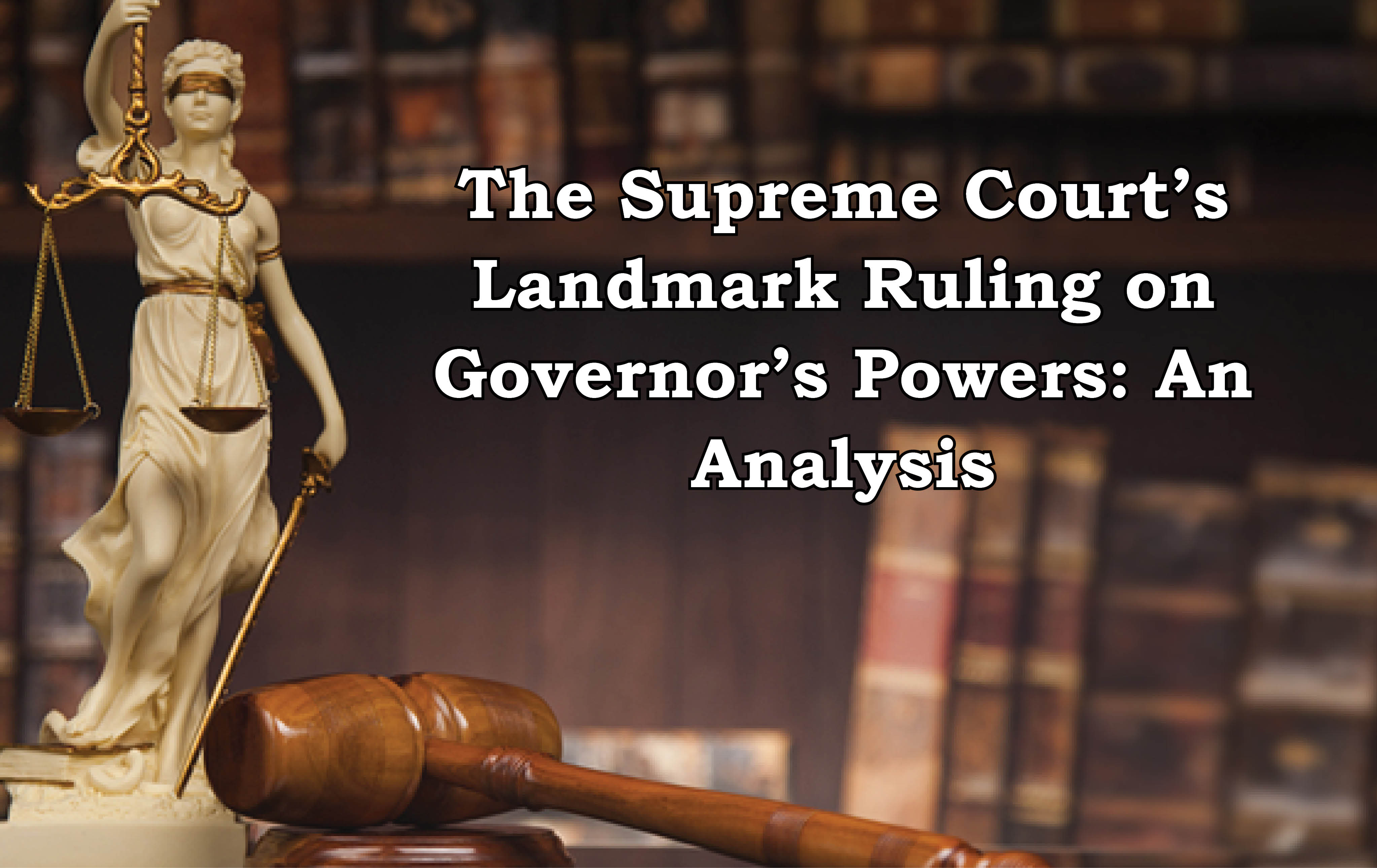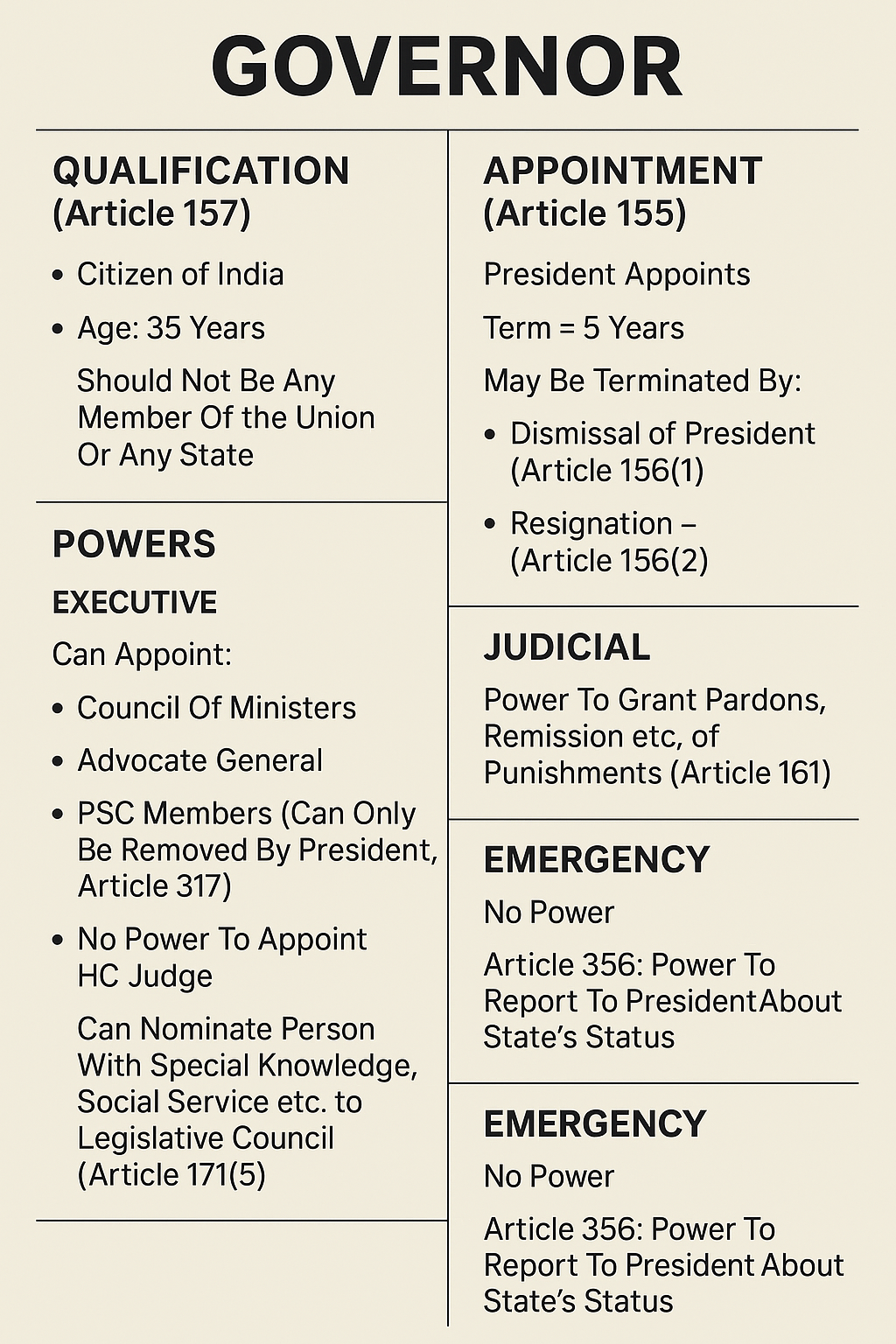Introduction:
The Supreme Court of India recently delivered a historic ruling in Government of Tamil Nadu vs Governor significantly redefining the constitutional role of Governors in granting or withholding assent to Bills passed by state legislatures. By invoking Article 142, the Court exercised its extraordinary powers to ensure "complete justice," effectively granting assent to 10 Bills that had been pending with the Tamil Nadu Governor.
This judgment not only resolves an ongoing constitutional deadlock but also sets a strong precedent regarding the Governor's discretionary powers under Article 200 of the Constitution. The decision reinforces the principle that the Governor is not an independent constitutional authority but is bound by the advice of the elected state government, except in exceptional cases.
Judicial Precedents and Context:
The Supreme Court’s judgment builds upon past rulings that have gradually curtailed the discretionary powers of the Governor. Several landmark cases have reaffirmed that the Governor’s role is largely ceremonial and that discretionary powers should be exercised only in exceptional circumstances.
1. Shamsher Singh v. State of Punjab (1974): This ruling established that the Governor is bound by the aid and advice of the Council of Ministers. The use of discretionary powers was deemed an exception rather than a general rule.
2. Rameshwar Prasad v. Union of India (2006): The Court held that the Governor’s personal opinion cannot be the sole basis for imposing President’s Rule under Article 356.
3. Nabam Rebia and Bamang Felix vs Deputy Speaker (2016): In this case, the Court clarified that the power to summon the legislative assembly does not rest solely with the Governor but must be exercised in consultation with the Council of Ministers.
Key Takeaways from the Supreme Court’s Ruling:
The Supreme Court’s judgment in the Tamil Nadu case brings clarity to the interpretation of Article 200 of the Constitution, which governs the Governor’s powers in granting or withholding assent to Bills. The key rulings include:
1. Rejection of Absolute and Pocket Veto
The Court ruled that the Constitution does not allow the Governor to exercise either an "absolute veto" or a "pocket veto."
- Absolute veto refers to outright refusal to assent to a Bill passed by the legislature.
- Pocket veto occurs when the Governor indefinitely delays taking action on a Bill, effectively stalling the legislative process.
2. Obligation to Act on the Advice of the State Government
The ruling reaffirmed that the Governor must act in accordance with the advice of the Council of Ministers, except in certain constitutionally defined situations. The only exception applies when a Bill affects the powers of the High Court or the Supreme Court, in which case the Governor may reserve it for the President’s consideration under Article 200.
3. Clear Timelines for Decision-Making
The Court set clear deadlines to prevent undue delays in granting assent to Bills.
- If a Bill is presented to the Governor, they must decide within a reasonable timeframe.
- If the Governor returns a Bill for reconsideration and the state legislature re-passes it, the Governor is constitutionally bound to grant assent.
Any failure to act within these timelines would make the Governor’s inaction subject to judicial review, thereby preventing deliberate obstruction of legislative processes.
4. Limits on Reserving Bills for Presidential Assent
The judgment clarified that once a Bill is reconsidered and re-passed by the state legislature without modifications, the Governor must grant assent. The Governor cannot reserve the Bill for Presidential consideration unless the content of the Bill is altered.
Broader Constitutional and Political Implications:
The Supreme Court’s intervention in this case has significant implications for the balance of power between the state legislature and the Governor’s office. The ruling:
1. Strengthens Federalism: By limiting the discretionary powers of the Governor, the judgment upholds the principles of cooperative federalism. It ensures that Governors act as facilitators of state governance rather than as political agents of the Union government.
2. Prevents Executive Overreach: The ruling sets a strong precedent against executive overreach by ensuring that Governors cannot arbitrarily withhold or delay assent to Bills.
3. Encourages Legislative Efficiency: By enforcing time-bound decision-making, the judgment promotes legislative efficiency and prevents disruptions in state governance.
Challenges:
1. Power to Grant Sanction for Prosecution
A major question remains regarding whether the Governor can independently grant sanction to prosecute state government officials.
2. Role in Government Formation
The Governor’s discretion in inviting political parties to form the government has been a recurring constitutional controversy.
While the Supreme Court has often called for floor tests as an immediate remedy, the larger constitutional questions surrounding the Governor’s role in government formation remain unresolved.
Conclusion:
The Supreme Court’s ruling in the Government of Tamil Nadu vs Governor Case is a landmark decision that significantly curtails the discretionary powers of the Governor in the legislative process. By:
- Prohibiting absolute and pocket vetoes,
- Reaffirming the Governor’s duty to act on ministerial advice,
- Setting clear timelines for decision-making,
- Limiting the Governor’s power to reserve Bills for Presidential assent,
The ruling strengthens legislative efficiency and democratic accountability.
This judgment marks a major shift in the interpretation of gubernatorial powers, reinforcing the federal structure of India’s democracy. While questions remain regarding the Governor’s role in prosecution sanctions and government formation, this ruling ensures that Governors cannot arbitrarily delay or obstruct the legislative functions of elected state governments.
As legal and political challenges continue, this ruling sets a strong precedent for future judicial interventions aimed at preserving constitutional values and preventing executive overreach.
| Main question: “The Governor is a constitutional functionary, not a representative of the Union government.” In the context of the Supreme Court’s recent judgment, discuss the necessity of maintaining the neutrality and objectivity of the Governor’s office. |










